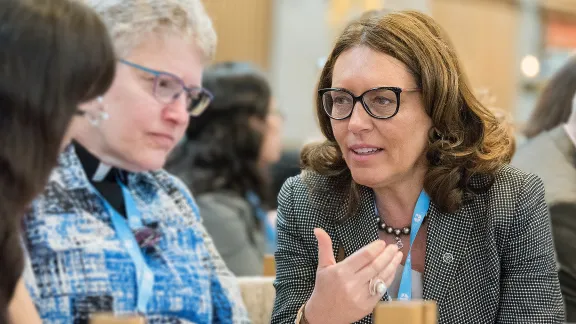
Cordelia Vitiello is a member of the LWF Council, representing Central and Western Europe. Her home church is the Evangelical Lutheran Church in Italy where she is actively engaged in the diaconal and social work. Photo: LWF/Albin Hillert
Interview with LWF Council member Cordelia Vitiello, Italy
(LWI) – “You have to keep a lot of things in mind if you really want to help people,” says Cordelia Vitiello, who is greatly involved in the diaconal work of her church, the Evangelical Lutheran Church in Italy (ELCI). In addition, she is active in ELCI leadership as vice-president of the consistory. And since 2017 she has been on the Council for the Central and Western Europe region of the Lutheran World Federation (LWF) – which is “wonderfully enriching and gives a new perspective,” she says.
In this interview with Lutheran World Information she talks about her commitment to people in need and the special encounters that involves.
Please introduce your church to us.
ELCI is a church in Italy, a country which is mainly Catholic. ELCI consists of 15 congregations totaling about 7,000 members, scattered all over the country from North to South. The office of the “consistory”, the church governing body, is in Rome – and I am its vice president.
In Italy we have a special way of financing church and cultural organizations. Tax-payers can designate a share of their income tax to a religious community that has signed a national agreement, or can leave it to the state to distribute undesignated contributions on a pro rata basis to these religious communities. This way of financing a church is called otto per mille, because it amounts to eight per mil (0.8 percent) of a person’s gross income tax.
In order to finance cultural projects, social institutions, education, research etc. you can also name the purpose of the cinque per mille tax (0.5 percent). Both taxes are compulsory and the tax-payer can choose the recipient.
Although we are only a small church, tens of thousands of tax-payers entrust their contribution to ELCI. That means that they appreciate our work.
Although we are only a small church, tens of thousands of tax-payers entrust their contribution to ELCI. That means that they appreciate our work, in my view. We use large parts of these funds for social and diaconal activities of our church in which we work closely with other churches in ecumenical networks.
What do you yourself do on behalf of ELCI?
I live in Naples, the third biggest city in Italy. It is an ancient port city with about a million inhabitants. Diaconal work is particularly close to my heart. Consequently, I have for years been particularly involved in the work of the Protestant hospital Ospedale Evangelico Betania and last year I was elected honorary president.
In October 2018 we celebrated the hospital’s 50th anniversary. It is run by an ecumenical foundation with participation by Lutherans, Methodists, Waldensians, Baptists, Adventists, the Salvation Army and the Apostolic Church. Today the hospital is an integral part of the health service in the Campania region. It has 158 beds and 420 staff, including 80 doctors. Every year about 13,000 patients are admitted and about 50,000 people are treated in the accident and emergency department.
Special diaconal projects are connected to the hospital, mainly financed by otto per mille and cinque per mille – e.g. since 2012 we have organized the Rose Rosa (“pink roses”) project, which assists pregnant and socially disadvantaged women. Another example is a mobile unit that drives to certain districts of Naples to offer medical treatment and advice. Via these contacts, people with either no money or no documents come to us for treatment in the regular health service – after all, many migrants from very different countries live in and around Naples. The ospedale solidale, solidarity hospital, is there to help them.
How does this work in practice?
The ospedale solidale is a combination of an out-patient department, which is open every Thursday, a hospital and an emergency department. Last year it provided treatment for about 3,000 people.
I can best explain what our work means with the following example: a while ago a woman was brought into the emergency room of the hospital and gave birth to a son. Gradually we learned about her story.
She is Nigerian, who is in Italy without valid papers. From Libya she was sold into prostitution by human traffickers. After her child was born she had to continue as a sex worker and got pregnant again. That is how she came back to our hospital because she had already found protection and refuge there. Our staff helped her to apply for asylum in order to escape her plight. Now she lives in sheltered family accommodation, which we run in ecumenical partnership with other churches and associations.
Does ELCI also have projects supported by the LWF?
Yes, the granello di senape (“mustard seed”) project in Sicily. This also focuses on migrants, who often reach Italy by crossing the Mediterranean. Since 2015 there has been an accommodation center for eight young Africans between the ages of 16 and 25. They come from Ivory Coast, Mali and Senegal and have residence permits. The staff in the mustard seed project help them to integrate into the social network in Catania. The young men aim to study, work and support themselves.
The Lutheran World Federation is a global body that shares the work and love of Christ in the world. In this series, we profile church leaders and staff as they discuss topical issues and set out ideas for building peace and justice in the world, ensuring the churches and communion grow in witness and strength.


